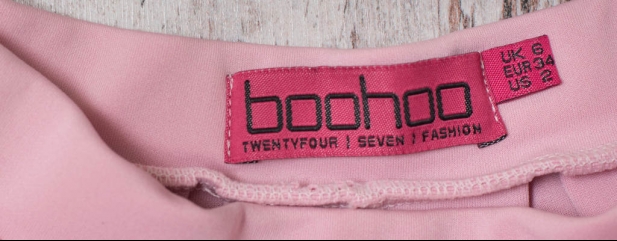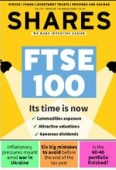Archived article
Please note that tax, investment, pension and ISA rules can change and the information and any views contained in this article may now be inaccurate.
The retailers on discount after a New Year rout

Consumer sentiment has deteriorated significantly in recent months due to high inflation, with the cost of living at decade highs and latterly, amid concerns over the escalating hostilities in Ukraine. Combined with the earnings impact of inflationary pressures, this has driven the share prices of big retailers sharply lower.
The weakness reflects downgrades already delivered, or negative revisions anticipated by the market.
Even before the invasion of Ukraine, the market expected cash-strapped consumers to begin tightening the purse strings.
Now the fear is war in Eastern Europe could delay and dampen the post-Omicron rebound in consumer spending as Putin’s attack triggers a further rise in inflation and rattles consumer confidence.
Shore Capital observed in early March that, depending on the duration of the crisis, ‘there will be two very different impacts on demand and supply.
‘We feel that demand could be negatively affected with the crisis in the spotlight albeit UK consumers will still seek to “get on with their lives”. Supply will undoubtedly be hit by energy-related cost inflation and any new disruptions to production and distribution chains.’
RETAILERS ROUTED
With the help of SharePad, Shares has crunched the data to reveal the retailers whose share prices have been hardest hit so far in 2022.
Among the biggest fallers are online fast fashion retailers ASOS (ASC) and Boohoo (BOO:AIM), which have both suspended sales to Russia. ASOS’ downgrades-driven downtrend has continued into the new year, while Boohoo posted a nasty profit warning just before Christmas.
Share price weakness reflects supply chain pain and muted near-term outlooks for both retailers, with investors pricing in the disproportionate impact of the cost of living squeeze on the purchasing power of their youthful shopper demographic.
In the FTSE 250, laptops-to-smart TVs seller Currys’ shares have cheapened 22.6% in the new year, with profit and earnings estimates for the 2022 and 2023 financial years negative over both one and three month periods, according to Stockopedia, as analysts factor in the rising costs facing the retailer as well as the significant near-term risks to UK consumer spending.
Many people have spent significant sums on new laptops, smart TVs and smartphones during the pandemic. This kit can comfortably last them for many years without the need to upgrade, which suggests Currys could struggle to deliver meaningful growth in the months ahead.
And Currys recently issued a cautious outlook statement (14 Jan), where it lowered full year pre-tax profit guidance from £160 million to £155 million.
BUY THE DIP
An indiscriminate retail sell-off has however created compelling new entry points in some quality names with very strong balance sheets.
Among FTSE 100 names, JD Sports Fashion (JD.) has slumped 37.8%, despite recently upgrading pre-tax profit guidance for the year ended 29 January 2022 to ‘at least £900 million’ as its positive Christmas trading continued into the new year.
Stockopedia’s system shows that consensus earnings estimates for the athleisure purveyor have actually held up well, with JD Sports seeing slightly positive earnings revisions on a three-month basis and a very modest drop on a one-month basis.
Besides wider consumer confidence concerns, JD Sports also sells to younger consumers, many of whom will pull their horns in.
Share price weakness here may reflect a spat with, and penalty imposed by, the Competition and Markets Authority, which is forcing JD Sports to sell Footasylum.
A recent share sale by executive chairman Peter Cowgill also spooked investors, though the correction provides an interesting entry point into the trainers-to-tracksuits seller. It has ceased all trading in Russia, which speaks for less than 0.05% of its annual revenues.
Among other best-in-class retailers, Next (NXT) is on a 12-month rolling forward price-to-earnings ratio of 11.1 according to Stockopedia, low relative to recent history.
Admittedly, consensus earnings per share estimates for the year to January 2023 have nudged down slightly over one and three months, yet the pullback should pique the interest of investors prepared to look past near-term uncertainties.
Shares in B&M European Value Retail (BME) have held up well, despite a pause for breath in the earnings revisions uptrend, as the variety goods retailer’s value proposition leaves it well positioned for inflationary times.
As household bills rise, Shares believes the groceries-to-general merchandise seller should benefit from cash-strapped consumers trading down.
In his most recent outlook statement (6 Jan), admittedly before Putin’s move on Ukraine, CEO Simon Arora said: ‘Despite ongoing supply chain disruption, inflationary pressures and uncertainty surrounding possible Covid-related restrictions, we remain confident in B&M’s prospects for 2022.’
Marks & Spencer (MKS), has just suspended shipments to Russia. The shares have been marked down 35.2% as investors weigh an uncertain economic outlook for 2022 which may halt turnaround progress.
Russia and Ukraine account for no more than 0.25% of group sales.
‘As such, the steps taken to stop supplying the Russian market are unhelpful to international earnings but do not represent a game changing development’, says Shore Capital.
Elsewhere, Mike Ashley’s Frasers (FRAS), the Sports Direct-to-House of Fraser owner which has just bought Studio Retail from the administrators, is down 27.4% year-to-date. This is despite a recent positive earnings revisions trend, based on Stockopedia analysis.
Dunelm (DNLM) has also been caught up in the selling, despite positive recent news.
On 9 February the homewares leader reported record first half profits amid continued outperformance of its core markets and assured investors trading in the second half to date ‘continued to be encouraging’, leaving Dunelm on course to deliver full year pre-tax profit in line with the recently upgraded consensus estimate of £206 million.
Important information:
These articles are provided by Shares magazine which is published by AJ Bell Media, a part of AJ Bell. Shares is not written by AJ Bell.
Shares is provided for your general information and use and is not a personal recommendation to invest. It is not intended to be relied upon by you in making or not making any investment decisions. The investments referred to in these articles will not be suitable for all investors. If in doubt please seek appropriate independent financial advice.
Investors acting on the information in these articles do so at their own risk and AJ Bell Media and its staff do not accept liability for losses suffered by investors as a result of their investment decisions.

 magazine
magazine









